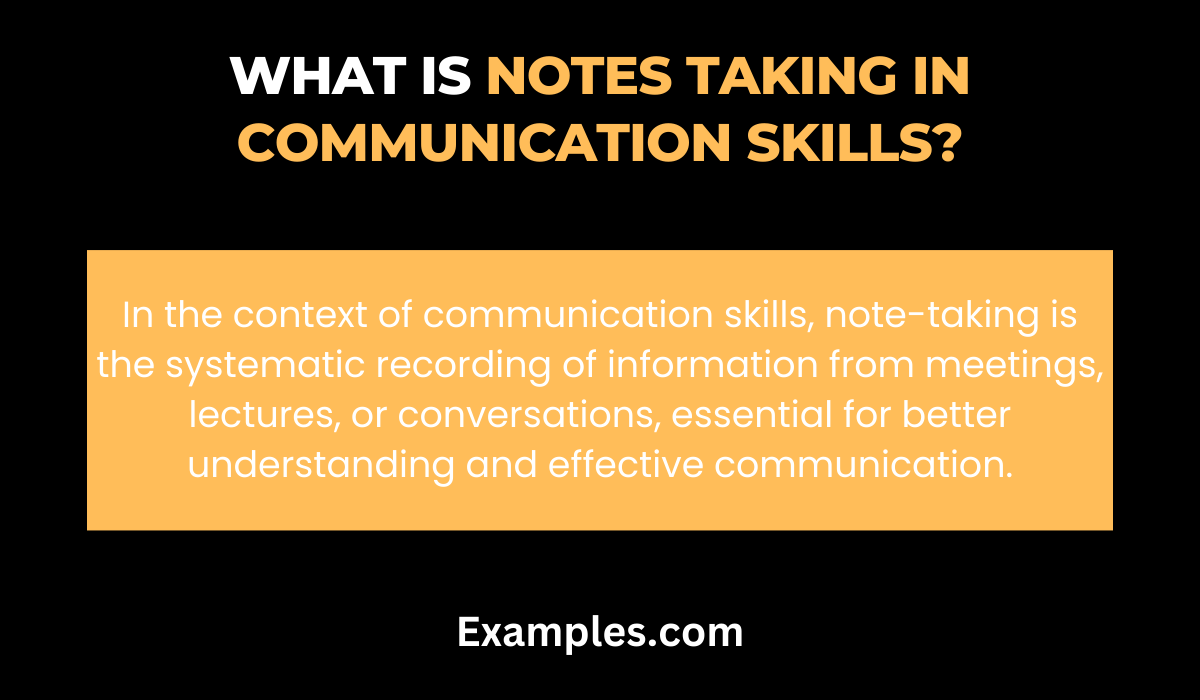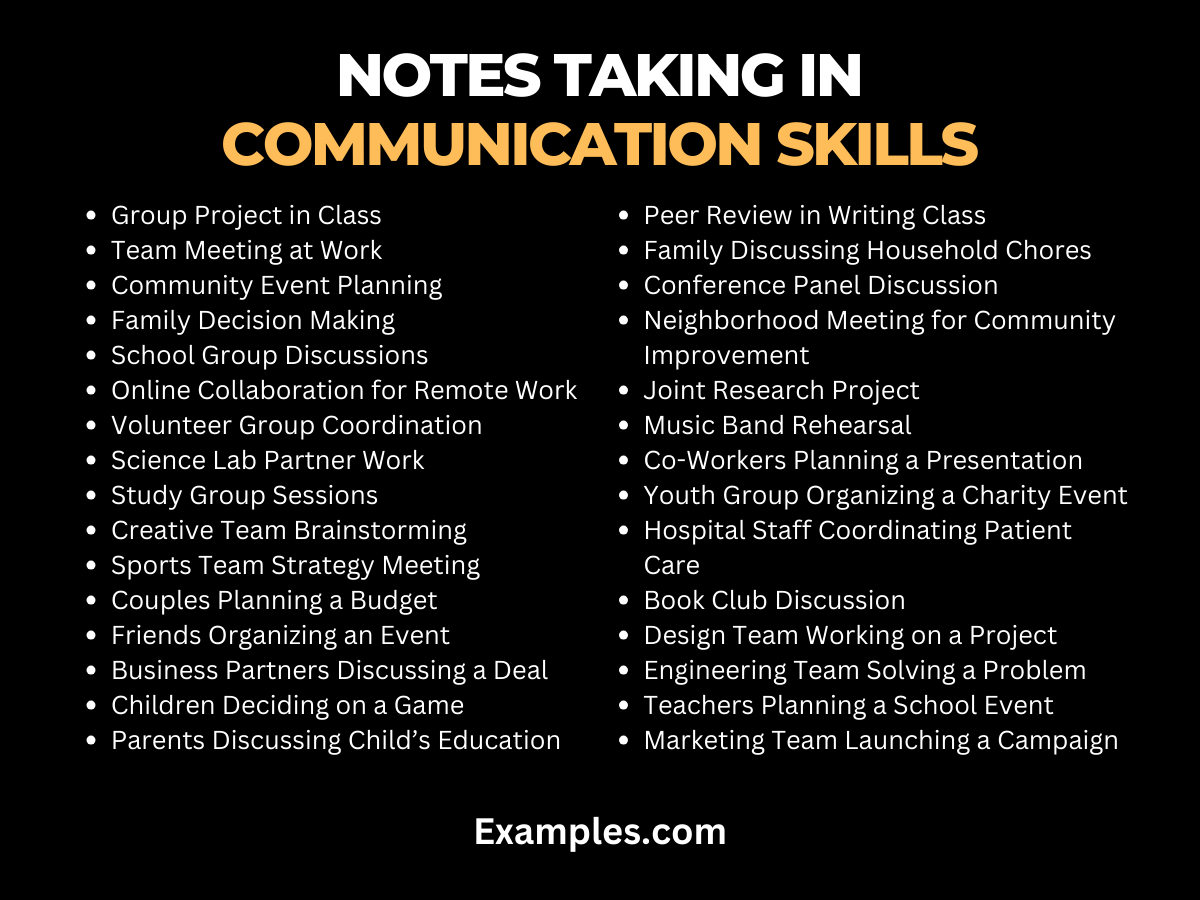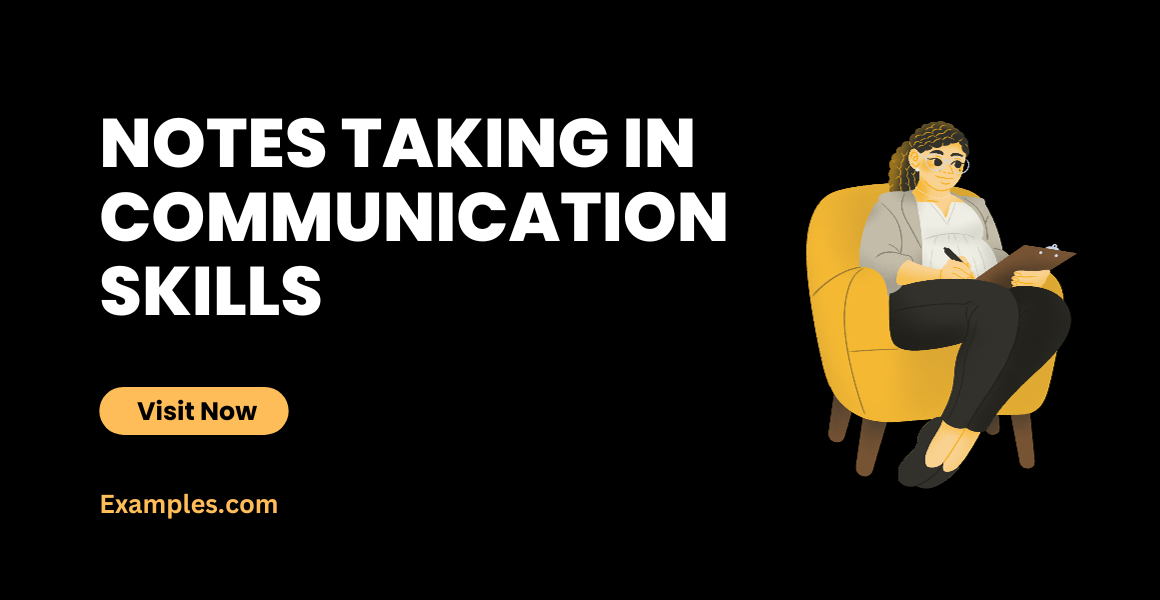29+ Notes Taking in Communication Skills Examples
Notes taking is an integral part of effective communication skills. It involves actively listening and accurately recording key information, aiding in better understanding and recall. This guide offers a comprehensive look at how to master note-taking, enhancing your ability to communicate effectively. From students to professionals, everyone can benefit from sharpening their note-taking skills, turning fleeting conversations into lasting knowledge.
What is Notes Taking in Communication Skills?
Notes taking in the context of communication skills refers to the practice of systematically recording information from various communication channels like meetings, lectures, or conversations. This skill is crucial for capturing essential details, aiding in comprehension, retention, and effective communication. It is a fundamental tool for anyone looking to improve their ability to process, understand, and relay information accurately.

30 Notes Taking in Communication Skills
Effective notes taking is a vital component of strong communication skills. It’s not just about writing down what you hear; it’s about capturing the essence of the information in a way that’s meaningful and useful to you. This skill is crucial in various settings, from academic to professional environments, and enhances understanding and engagement in communication processes.

- During a Lecture: A student writes, “Prof. Smith emphasizes three main causes of climate change,” capturing the key points of the lecture for later review.
- In a Business Meeting: An attendee notes, “Project deadline moved to Dec 15th – requires team re-allocation,” ensuring crucial changes are recorded.
- While Reading a Book: A reader jots down, “Chapter 4 – Communication theories explained with examples,” for easy reference during discussions or future studies.
- During a Workshop: A participant notes, “Speaker’s contact info and recommended resources list,” to follow up on valuable connections and materials.
- In a Therapy Session: A therapist writes, “Client discusses childhood experiences related to current anxiety,” for better understanding and future reference.
- While Watching a Documentary: A viewer notes, “Key statistics about ocean pollution presented at 10:45,” to use accurate data in future arguments or presentations.
- During a Podcast: A listener records, “Episode 5 – Tips on public speaking, need to practice these,” for personal development.

- In a Parent-Teacher Meeting: A parent notes, “Teacher’s feedback on child’s math skills – suggested extra practice at home,” to support their child’s learning journey.
- While Planning an Event: An organizer writes, “Venue booked on June 20th, deposit paid,” to keep track of crucial event details.
- During a Counseling Session: A counselor notes, “Client’s goals for the next month – focus on building self-esteem,” to tailor future sessions effectively.
- In a Legal Consultation: A client records, “Lawyer advised documentation needed for the case – list of documents,” to ensure all necessary preparations are made.
- During a Cooking Class: A participant jots down, “Chef’s secret ingredient for the sauce – must try at home,” to recreate the recipe accurately.
- In a Fitness Training Session: A trainee notes, “Trainer’s recommendations for daily exercises – routine schedule,” to adhere to their fitness goals.
- While Researching Online: A researcher writes, “Found a relevant study on consumer behavior at JSTOR,” to cite in their project.
- During a News Broadcast: A viewer records, “Government announces new policy on renewable energy,” to stay informed about current affairs.
- In a Book Club Meeting: A member notes, “Group’s next book selection and meeting date,” to prepare for the next discussion.
- While Attending a Conference: An attendee writes, “Keynote speaker’s main arguments about technology in education,” to share insights with colleagues.
- During a Networking Event: A professional jots down, “Contacts made and potential collaboration ideas,” for future business opportunities.
- In a Science Experiment: A student records, “Observations and results of the chemical reaction,” for their lab report.
- While Watching a Webinar: A participant notes, “Useful websites and tools mentioned for digital marketing,” to enhance their professional skills.
- During a Sales Presentation: A salesperson writes, “Client’s concerns and specific needs,” to tailor their sales pitch accordingly.
- In a Yoga Class: A yogi notes, “New poses learned and tips from the instructor,” for practice at home.

- While Listening to a History Lecture: A student records, “Dates and events of the World War II,” for exam preparation.
- During a Financial Planning Session: A client jots down, “Advisor’s suggestions for investment portfolio diversification,” for their financial strategy.
- In a Tech Workshop: An attendee writes, “Upcoming trends in AI discussed – possible areas for development,” to stay ahead in their field.
- During a Volunteer Training: A volunteer notes, “Procedures and protocols for the event,” to ensure a smooth operation.
- In a Language Class: A learner records, “New vocabulary and phrases in Spanish,” for practicing their language skills.
- While Planning a Trip: A traveler jots down, “Itinerary details and must-visit places,” for a well-organized journey.
- In a Photography Course: A student writes, “Instructor’s tips on landscape photography,” to apply during their next shoot.
- During a Gardening Workshop: A participant notes, “Types of soil and suitable plants for each,” to apply in their garden.
What is the role of Notes Taking in Communication Skills
Note-taking plays a pivotal role in enhancing communication skills, especially in the context of brand communication. It aids in capturing crucial information, fostering a better understanding of the communicated message, and ensuring that important details are not overlooked.
- Recording Client Feedback: Documenting client feedback during meetings for future reference.
- Capturing Brainstorming Ideas: Jotting down creative ideas in brand strategy sessions.
- Meeting Summaries: Writing summaries of team meetings to track progress and decisions.
- Project Milestones: Noting key milestones in a project for effective team communication.
- Training Sessions: Taking notes during training to enhance learning and implementation.
- Client Requirements: Detailing client requirements in briefs for precise execution.
- Marketing Strategies: Documenting marketing strategy discussions for clarity and alignment.
- Sales Pitches: Outlining key points in sales pitches to ensure message consistency.
- Product Feedback: Recording product feedback for improvement in future designs.
- Competitor Analysis: Noting observations from competitor analysis for strategic planning.
Why it is Importance to Take Notes in Communication Skills
In the realm of brand communication, the importance of note-taking cannot be overstated. It is essential for keeping track of client needs, market trends, and internal strategies, ultimately enhancing the effectiveness of communication.
- Improving Follow-up: Ensuring accurate follow-up actions based on documented discussions.
- Enhancing Memory: Aiding memory recall of important conversations and meetings.
- Detail Retention: Facilitating the retention of intricate details of brand strategies.
- Client Relations: Enhancing client relations through detailed understanding of their needs.
- Training Efficiency: Improving the efficiency of training sessions by referencing notes.
- Strategy Development: Assisting in the development of coherent and effective strategies.
- Error Reduction: Reducing errors in execution by referring to detailed notes.
- Collaborative Projects: Facilitating collaborative projects with clear, shared notes.
- Performance Reviews: Using notes to assess performance and plan improvements.
- Market Insights: Gathering and retaining valuable market insights for strategic decisions.
Why note making is useful in communication?
Note-making is a vital tool in communication, particularly in brand communication, where empathy in communication skills and accurate information dissemination are key.
- Clarifying Communication: Ensuring clarity in communication by recording key points.
- Strategic Planning: Aiding in strategic planning with comprehensive notes.
- Customer Insights: Capturing customer insights for targeted communication strategies.
- Avoiding Misunderstandings: Preventing misunderstandings by referring to exact notes.
- Team Coordination: Enhancing team coordination through shared and clear notes.
- Product Development: Informing product development with detailed customer feedback notes.
- Effective Presentations: Preparing for effective presentations with well-organized notes.
- Creative Processes: Fueling the creative process with a compilation of ideas and feedback.
- Decision Making: Assisting in informed decision-making with detailed records.
- Compliance and Reporting: Facilitating compliance and reporting through accurate record-keeping.
Benefits of Notes Taking in Communication Skills
Effective notes taking is a pivotal element in honing your communication skills. It involves actively listening and summarizing key points, which enhances understanding and recall. In professional settings, especially in areas like brand communication, taking notes can be a game-changer. Let’s explore ten significant benefits.
- Enhances Understanding: Jotting down key points during discussions or meetings can help in better grasping complex brand communication strategies.
- Improves Retention: Writing down information aids in retaining important details, crucial for executing effective communication skills.
- Facilitates Follow-up: Notes serve as a reference for future actions, ensuring consistency in brand communication.
- Encourages Active Engagement: Engaging in notes taking keeps you actively involved in the communication process.
- Aids in Clarification: Notes can be used to seek clarification on unclear points, refining your communication skills.
- Enhances Organizational Skills: Organizing notes effectively leads to more structured and coherent brand communication.
- Supports Idea Generation: Notes can spark new ideas, contributing to innovative communication strategies.
- Assists in Conflict Resolution: Accurate notes can help in resolving misunderstandings in brand communication.
- Boosts Confidence: Being well-prepared with notes can increase confidence in your communication abilities.
- Facilitates Effective Feedback: Notes can guide providing constructive feedback, a key aspect of communication skills.
Tips for Notes Taking in Communication Skills
Mastering notes taking is vital for enhancing communication skills, particularly in brand communication. Whether you’re in a meeting or strategizing a campaign, effective notes taking can significantly impact your success. Here are ten practical tips.
- Use Keywords: Focus on main ideas and keywords related to brand communication.
- Be Concise: Keep your notes brief yet informative, capturing the essence of the communication.
- Develop a System: Use symbols or shorthand for efficiency in notes taking.
- Organize Logically: Structure your notes in a way that reflects the flow of the communication.
- Review Regularly: Regularly review your notes to reinforce your understanding of brand communication strategies.
- Utilize Technology: Leverage digital tools for taking and organizing notes.
- Listen Actively: Stay engaged and listen actively to capture crucial information.
- Ask Questions: If something is unclear, don’t hesitate to ask for clarification.
- Highlight Actions: Mark actionable items distinctly to ensure follow-up.
- Practice: Like any skill, improving notes taking in communication skills requires practice.
In sum, notes taking is an invaluable skill in communication, especially in the realm of brand communication. It not only enhances understanding and retention but also aids in organizing thoughts and ideas effectively. By following these tips and recognizing the benefits, one can significantly improve their communication proficiency, leading to more successful personal and professional interactions.
For further enrichment, readers might explore the Harvard Business Review’s guide on effective note-taking, which provides insights into enhancing this skill in professional settings. Additionally, The Cornell University’s Learning Strategies Center offers valuable resources and techniques for improving note-taking, especially for students and academic professionals, enhancing their learning and communication skills.



